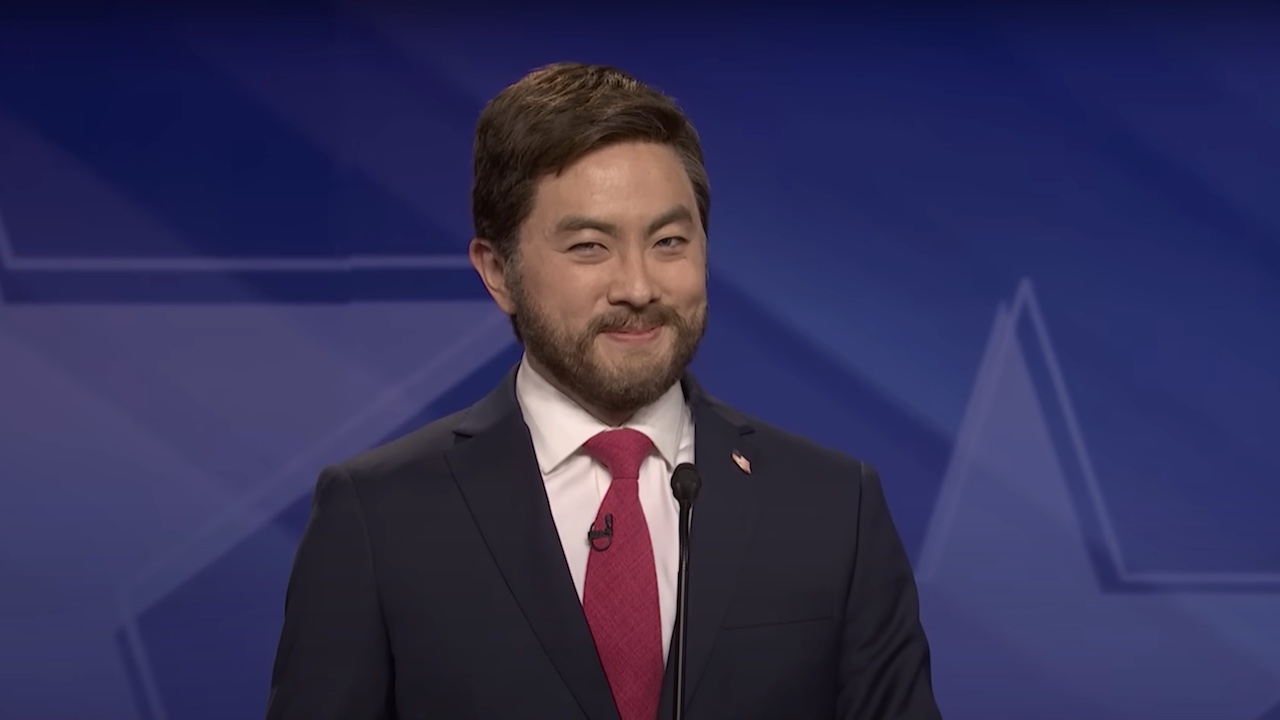"Today we are canceling the apocalypse!"
That's just one of the many--but probably the best-- overheated lines of dialogue in Pacific Rim, a movie that promises bigness and grandness with its every fiber and then strains so very hard to deliver. As said by the masterful Idris Elba, the line works, but not nearly as well in context as it has in the trailers. It's part of the rally-the-troops speech before the final action scene, a moment where our heroes are supposed to screw up their courage and charge into battle with flags flying. It's a moment we've seen in countless war movies and alien movies and combinations of the two. And in Pacific Rim the scene feels like an adoring but empty cover of everything that's come before it.
Director and co-writer Guillermo del Toro, whose boundless imagination has given us wonders like Pan's Labyrinth and Hellboy, dives deep into paying homage to his inspirations in Pacific Rim, and in doing so drifts dangerously away from the wild spark that has made his own work unique. Pacific Rim is a very expensive, very lovingly crafted riff, a monster movie updated for modern times that never gets out from under the shadow of everything that inspired it. From Charlie Hunnam's stern-jawed hero Raleigh Becket to the robot fights to Elba's tough general-type (with the wondrous name Stacker Pentecost), it all feels familiar-- even when it's exciting, it's an excitement you've felt before.
To its credit, what Pacific Rim gets right is what many other large sci-fi films garble badly. Del Toro and Travis Beacham's script does a wonderful, efficient job of setting up this world, in which enormous monsters-- called kaiju-- have risen from the sea and humanity has built giant robots-- called jaegers-- to fight them. The best twist of all is the way the jaegers are operating, requiring two pilots to link their brains in a "drift" and operate the machine together, standing side by side and moving in unison-- like a really complicated, really high-stakes version of Microsoft Kinect. Raleigh Becket and his brother (Diego Kalttenhoff) were two of the best pilots until one spectacular action scene at the beginning puts their partnership to an end, and five years later, with the jaeger program about to be retired in favor of giant ocean-blocking walls, Raleigh is brought back into action and paired up with rookie co-pilot Mako Mori (Rinko Kikuchi) for one last shot at saving humanity.
And unlike Michael Bay's Transformers movies, or even last year's Prometheus, which seem not to know how ridiculous they look when taking themselves so seriously, Pacific Rim embraces its pulp, from the out-there names to the clanging fight scenes, which will inspire glee and applause form virtually anyone who ever crashed their action figures together. It is not easy to make the robots and monsters look all that different from one another, and though things can get murky when there's more than one of each on the scene (why oh why does every action scene take place at night in the rain?), the one-on-one confrontations carry great weight and clarity-- you see the jaeger punch a kaiju in its big belly, or the terrifying glowing mouth of one kaiju descend toward hapless civilians. None of it is as clear and striking as it ought to be-- Pacific Rim is, sadly, no exception to the modern norm of chaotic action-- but each big scene has one or two great moments. I know, that's not as much as I was hoping for either.
If the action scenes were hard to follow but emotionally important, or even logically motivated, they would work fine. But the rules of jaeger vs. kaiju combat are complicated and only get more so as the film goes on, with Elba or Charlie Day's slacker scientist character constantly brought in to provide more exposition, shouting "It's not going to work!" or "You have to go now!" for reasons we can't come close to comprehending. It's one thing for the space surrounding the robots to be a little unclear-- giant city fight scenes can't always be precisely mapped-- but even the interior of the jaegers is fuzzy, to the point that we don't know which team of jaeger pilots we're watching without a tight closeup. When Raleigh runs around inside the cockpit in the final act, we have no idea what he's looking for-- it's only the crashing score, by a Hans Zimmer-aping Ramin Djawadi, that tells us he's in danger.
The piloting of the jaeger is all about the internal link, called "neural handshake," between the pilots themselves, but even that part is unclear. In their first attempt to "drift" Raleigh is pulled inside Mako's memories (a bit of heavy-handed exposition, naturally), but when the drift works properly, they're supposedly thinking with one brain… though still barking instructions at each other out loud. The drift is supposed to be a powerful, emotional bond, but Mako and Raleigh seem about as close as your average cubicle-mates-- and Hunnam's leaden performance and Kikuchi's language barrier sure don't help matters. Over and over again Pacific Rim has characters tell us that things are important, while barely attempting to actually show us.
I'm as sorry as anyone that Pacific Rim is entertaining, occasionally rousing, but also a mess. We badly need filmmakers like del Toro who are committed to original stories, and in a time when we can create giant robots out of computer pixels, it's a crime for Michael Bay to be the only person who gets to play with them. Pacific Rim is shiny and big and eager to please, but its originality can't save it from feeling as derivative and empty as any cobbled-together remake. It's the first del Toro film in which imagination has felt in short supply. That, more than anything, makes Pacific Rim an unfortunate disappointment.
Staff Writer at CinemaBlend












